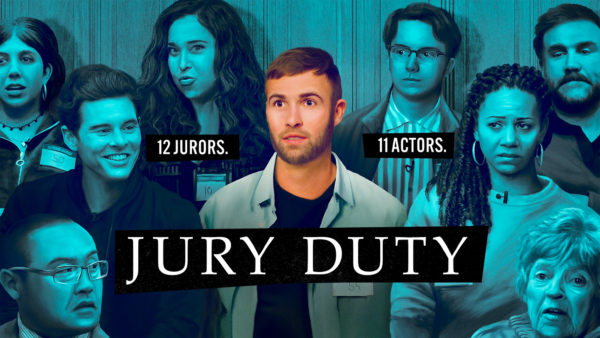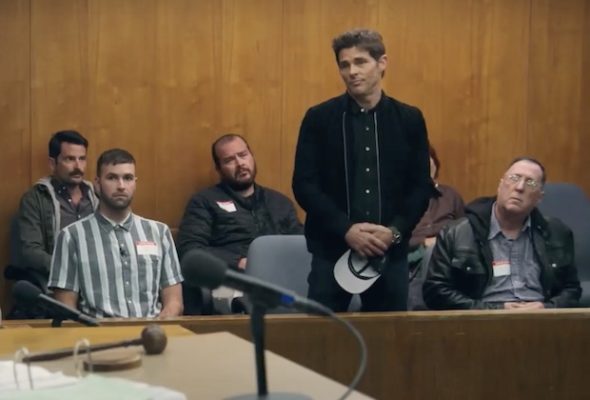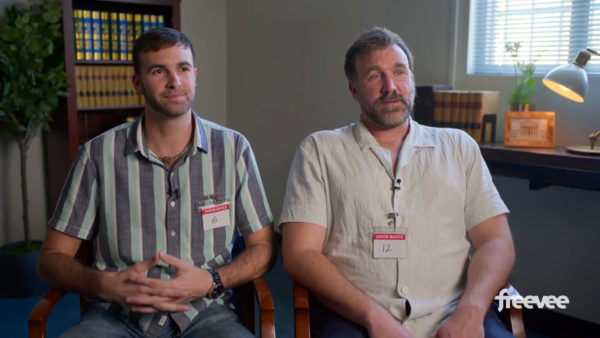
There’s a finite number of reality TV premises, most of which have been thoroughly explored. While Jury Duty, Amazon Freevee’s new series, isn’t exactly breaking the mold, the comedy – which hails from the producers of The Office –feels like a slightly fresh take on a familiar idea.
In this case, it’s a gentle mockumentary of a relatively mundane situation – jury duty – only with a reality TV hook. What if, instead of exploring the ins and outs of the legal system, the whole thing was fake? The judge, the courtroom, the case, and eleven out of the twelve jurors…all fake? How would it play out for the one real person engaging in all of the madness?
Enter Ronald Gladden, an average man who believes that he’s signed up to participate in a documentary about the jury process, hence the ever-present cameras (never mind the endless covert cameras that are constantly capturing b-roll and other angles). Ronald is kind; he’s unassuming in cute white guy fashion, and he gives killer (genuine) reaction shots when the shit hits the proverbial fan over the course of the eight episodes.
The series is obviously high concept – equal parts documentary and workplace comedy. While Jury Duty never falls into malicious territory, the simple fact that every episode opens with a typed disclaimer about how the trial is fake and so are all of its jurors (…save one) is both the premise and something of a prank.
Initially the show is dominated by its one celebrity actor, James Marsden (playing a dickish, entitled version of himself). Marsden’s celebrity is a major plot line throughout the series, though it takes nearly half the season for the showrunners to figure out how and when to use him.
Jury Duty eventually strikes a balance between his antics and other plot lines, but early on the show struggles to get out from under his shadow. What starts off as an amusing opportunity for the actor to lampoon his nice guy reputation quickly becomes overbearing. When Marsden begins to blend into the cast more, however, it opens up space for the others, several of whom are familiar TV character actors, to establish a relationship with Ronald. Still, by the end of the series, several of the jurors remain underdeveloped, which is disappointing.

The third episode, “Foreperson” is where Jury Duty really hits its stride. This is when Donald is appointed foreperson of the jury (a role he doesn’t want, naturally) and the truth about meek virgin Noah’s relationship with his internet girlfriend Chloe is revealed. In a hilarious turn of events, everyone on the jury becomes involved in an investigation of whether Chloe is being unfaithful via an in-depth discussion of the gender implications of the name “Cody” and a revealing Instagram picture.
And there are plenty of ridiculous events spread out over the series. There’s a bathroom incident involving Marsden, courtroom hijinks involving a poorly rendered animated recreation of the crime and one bizarre sequence with techno human juror Todd and his chair-pants or “chants” (crutches attached to pants). Then later, after the group is sequestered at the end of the episode one, the action extends to the motel (where Ronald acts as wingman to Noah and Jeannie’s “soaking” hook-up), and beyond (an ill-fated trip to Margaritaville includes an incendiary item of clothing and a mistaken non-virgin cocktail).
Most of these interactions are believably wacky, and even those that strain credibility, such as the testimony and evidence portion of the court proceedings, are never taken too far. Ronald generally just assumes that his fellow jurors and the case are kooky. (Sidebar: one technical aspect that doesn’t work are in-character confessionals by the other jurors when Ronald isn’t around. It makes no sense because the audience is in on the joke, so there’s no need to keep up the ruse for our benefit.)
The series is obviously high concept – equal parts documentary and workplace comedy – as evidenced by each episode’s typed disclaimer that the trial is fake and so are all of its jurors (…save one). It is important to note, however, that the premise/central joke of Jury Duty never falls into malicious territory.

All of the wackiness works because it isn’t at Ronald’s expense. If anything, Jury Duty is surprisingly protective of its protagonist, and frequently manages to wring both heart and amusement out of Ronald’s reactions. There’s a sweetness and a sincerity to a lot of his interactions with the others that the show leans into, even when the most ludicrous thing is happening.
This delicate balance really pays off in the final episode when the truth inevitably comes out. The finale is unexpected and joyous in ways that make the series feel less like an elaborate prank and more like a celebration of Ronald’s humanity.
It’s the exact right amount of sentimentality and it makes Jury Duty an unorthodox, but worthwhile, recommendation. 4/5
Jury Duty is available on Amazon Freevee